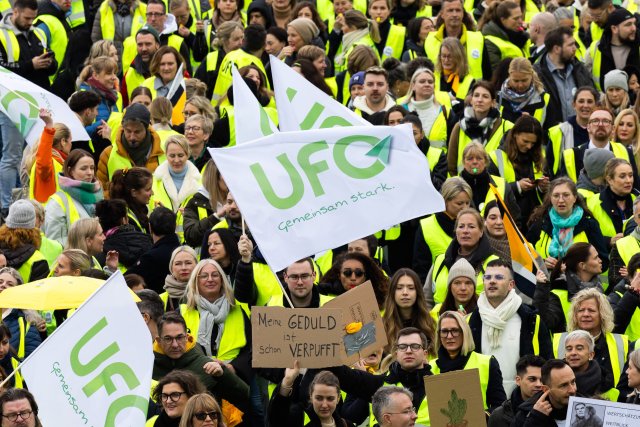Whether railway workers, educators, nursing staff or, as here, flight attendants: Germany is in a strike mood.
Foto: picture alliance/dpa
A wave of protests is sweeping through the Federal Republic, something that has not been seen for a long time, most recently in the early 1980s. Germany is not exactly a classic strike country; France, Italy, Greece and Spain are more like it. However, their workers and farmers are now more likely to imitate the Germans, as the tractor demonstrations show. The majority of the population in this country understands the strikes and protests (even if this is not reflected in the media); many take part, others know that success will also benefit them. This book appears at the right time. Using seven countries, Ulrike Eifler examines the “interplay between global protest, growing authoritarianism and the ability of trade unions to act as the major class organizations of the present,” as Heinz Bierbaum, President of the European Left, writes in his foreword.
Born in 1975, the studied political scientist and sociologist, who worked as a journalist and trade union official, is particularly interested in the combination of current “significant economic, social and political, even tectonic upheavals” and the profound transformations of the economy (“one based on fossil energies based industry no longer has a future”), but also about new working environments in the wake of the Corona crisis and the general uncertainty caused by the new wars worldwide, and recently even in Europe again. At the same time, Ulrike Eifler notes the rise of right-wing populist and right-wing extremist forces. “One of the most significant social and political results in response to the changes is the sharp increase in authoritarian tendencies.”
These are increasing around the globe, from Greece to the USA to South Korea. “There are contacts among the extreme right that extend far beyond the borders of Europe.” And unfortunately the rise of authoritarian presidents is also globalizing. Which significantly affects the conditions for industrial disputes. “Although there was also a ‘comeback of labor disputes’ in the wake of the anti-crisis protests, trade unions were rarely the initiators of a broader social protest,” diagnoses the author. In Tunisia it was the precarious youth, in Hong Kong it was schoolchildren and students, and in Chile too, where outrage over fare increases brought traffic to a standstill across almost the entire country. The same applies to South Africa and the Philippines.
nd.DieWoche – our weekly newsletter

With our weekly newsletter nd.DieWoche look at the most important topics of the week and read them Highlights our Saturday edition on Friday. Get your free subscription here.
Ulrike Eifler states: “Although the unions are nowhere among the protest initiators, the social movements gain broader social breadth and gain a perspective for enforcement as soon as unions call for participation.” In Hong Kong, for example, 350,000 employees followed the call for a general strike. For industrialized countries in the Global North such as the USA, Great Britain, Spain, Ireland, Portugal and France, after 2011 it was observed that left-wing parties and candidates gained support, which on the one hand was an expression of the new social movements and on the other hand promoted the politicization of strikes. Unfortunately, this finding does not apply to Germany, where the SPD and even more so the Left Party are suffering significant losses in reputation and probably votes. Surprisingly, there is no country study on Germany in this book.
The author attributes the growth of right-wing parties that are riding on the protest movements to the “organic crisis” (Frank Deppe) of capitalism. With the financial crisis, neoliberalism discredited itself ideologically and politically, not only because of the billion-dollar state rescue packages for the “systemically important” banks that were threatened with bankruptcy, while there were serious cuts in the social sector. The “repressive expansion of the state” in the wake of terrorist attacks like in Paris in 2015 or to contain the pandemic has also fueled right-wing forces worldwide.
Authoritarian populists play on fears of decline in the middle class, which Donald Trump, for example, successfully achieved in the USA, who was able to enjoy the support of white industrial workers in Ohio, Michigan and Pennsylvania. Or Viktor Orbán in Hungary, who took advantage of the unfounded fear of a loss of prosperity due to migrants, as did his spiritual companion Marine Le Pen in France. The wealth chauvinism of the middle class is also responsible for the rise of authoritarian regimes in the Philippines and Thailand. The author sees the commonality of authoritarian developments in a North-South comparison as “the cessation of wage-earner power” as a prerequisite for the reorganization or retention of power of the bourgeois forces.
In special chapters, Ulrike Eifler analyzes the authoritarian crisis management during the Corona period, which turned out very differently and yet played into the hands of the right everywhere. But the author looks deeper: “The fact that the pandemic acted as an inequality amplifier was not least due to the fact that many societies around the world had gone through a decades-long process of deregulation, flexibilization and liberalization. The mostly strict curfews hit working societies that did not protect the population, but instead plunged them into existential crises under the conditions of the pandemic. Ulrike Eifler cites a number of professional groups as examples, including those working in the arts, who expressed their massive crisis experiences by staging catastrophes and dystopias processed, thus accurately capturing the mood of society. “Currently they reflect social pessimism.”
However, Ulrike Eifler herself also has a happy, hopeful message ready: The increased global frustration with political and social contradictions is being expressed in a renaissance of labor disputes and social movements that are condensing into a new global protest cycle, no matter how detailed they may be Distinguish between the cause of the protest and the goal of the protest. “But they are united by their refusal to continue to uncomplainingly accept the prioritization of economic over social issues.”
Ulrike Eifler: Trade union power resources between authoritarianism and awakening. Global protest cycle and globalization of authoritarianism. Westphalian steamboat, 327 p., br., 30 €.
Become a member of the nd.Genossenschaft!

Since January 1, 2022, the »nd« will be published as an independent left-wing newspaper owned by the staff and readers. Be there and support media diversity and visible left-wing positions as a cooperative member. Fill out the membership form now.
More information on www.dasnd.de/genossenschaft
judi bola online judi bola sbobet akun demo slot
